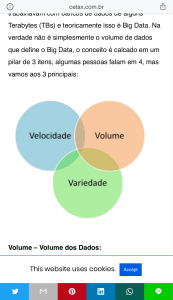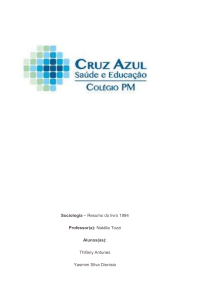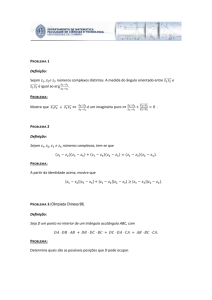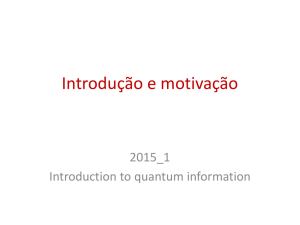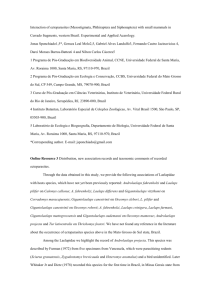Keynote Speakers|Palenstrantes Internacionais Prof. Dr. Edson Luiz Riccio
advertisement
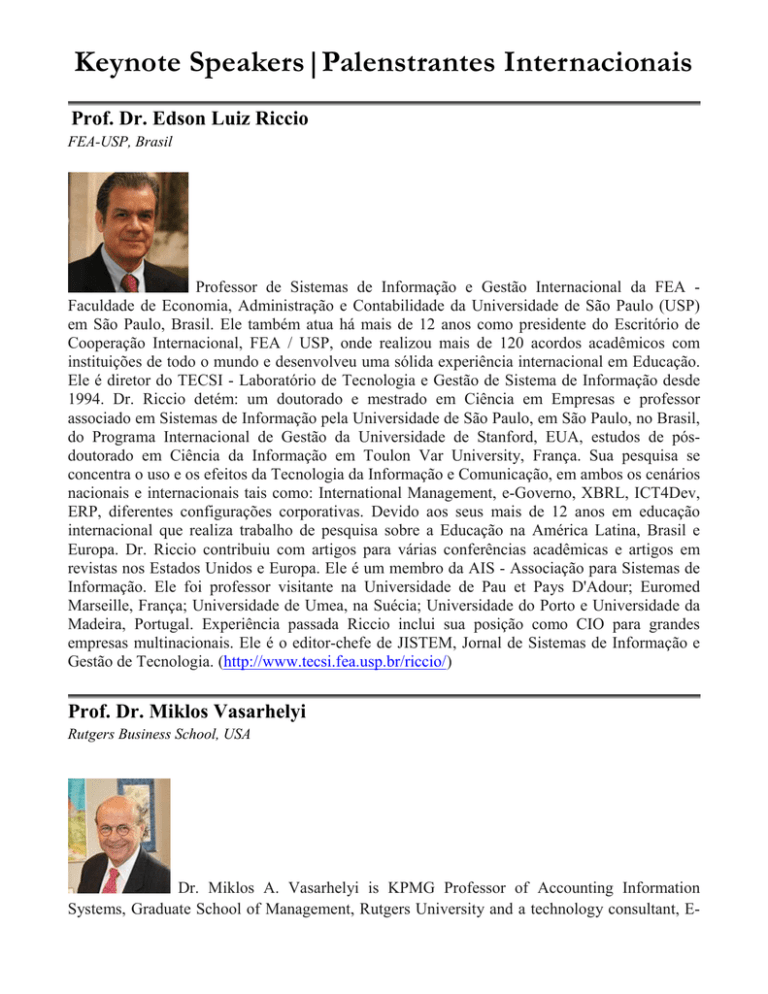
Keynote Speakers|Palenstrantes Internacionais Prof. Dr. Edson Luiz Riccio FEA-USP, Brasil Professor de Sistemas de Informação e Gestão Internacional da FEA Faculdade de Economia, Administração e Contabilidade da Universidade de São Paulo (USP) em São Paulo, Brasil. Ele também atua há mais de 12 anos como presidente do Escritório de Cooperação Internacional, FEA / USP, onde realizou mais de 120 acordos acadêmicos com instituições de todo o mundo e desenvolveu uma sólida experiência internacional em Educação. Ele é diretor do TECSI - Laboratório de Tecnologia e Gestão de Sistema de Informação desde 1994. Dr. Riccio detém: um doutorado e mestrado em Ciência em Empresas e professor associado em Sistemas de Informação pela Universidade de São Paulo, em São Paulo, no Brasil, do Programa Internacional de Gestão da Universidade de Stanford, EUA, estudos de pósdoutorado em Ciência da Informação em Toulon Var University, França. Sua pesquisa se concentra o uso e os efeitos da Tecnologia da Informação e Comunicação, em ambos os cenários nacionais e internacionais tais como: International Management, e-Governo, XBRL, ICT4Dev, ERP, diferentes configurações corporativas. Devido aos seus mais de 12 anos em educação internacional que realiza trabalho de pesquisa sobre a Educação na América Latina, Brasil e Europa. Dr. Riccio contribuiu com artigos para várias conferências acadêmicas e artigos em revistas nos Estados Unidos e Europa. Ele é um membro da AIS - Associação para Sistemas de Informação. Ele foi professor visitante na Universidade de Pau et Pays D'Adour; Euromed Marseille, França; Universidade de Umea, na Suécia; Universidade do Porto e Universidade da Madeira, Portugal. Experiência passada Riccio inclui sua posição como CIO para grandes empresas multinacionais. Ele é o editor-chefe de JISTEM, Jornal de Sistemas de Informação e Gestão de Tecnologia. (http://www.tecsi.fea.usp.br/riccio/) Prof. Dr. Miklos Vasarhelyi Rutgers Business School, USA Dr. Miklos A. Vasarhelyi is KPMG Professor of Accounting Information Systems, Graduate School of Management, Rutgers University and a technology consultant, E- commerce Solutions Group AT&T Laboratories. He has his BS degree from the State University of Guanabara (Economics) and the Catholic University of Rio de Janeiro (Electrical Engineering) an MBA from the Massachusetts Institute of Technology and his Ph.D. in Management from the University of California, Los Angeles (Management Systems Information). Current research interests of Prof. Vasarhelyi dealing with the area of monitoring, auditing / continuous control, business agents and electronic commerce. He has taught accounting topics and system programs for both graduate and executive in the U.S., Europe and South America consulted on accounting matters and information to the government and big business in the U.S., Europe and Brazil. He has received research grants from the FASB, the Touche Ross Foundation, the Peat, Marwick and Mitchell Foundation, the American Accounting Association, Accounting Education Change Commission, the Institute of Internal Auditors, Ernst & Young, and others. Prof. Vasarhelyi is the director of the Rutgers Accounting Research Center also Laboratory Continuous Auditing and Reporting (Carlab). (http://raw.rutgers.edu/Miklos) BIG DATA AND THE TRANSFORMATION OF AUDITING Over the last two decades a slow evolution towards a more “continuous” and “analytic-based” auditing has started to change the nature of auditing. Terminologies like predictive, preventive, and analytic audit have become more common as the needs of assurance on progressively complex and opaque automated systems have emerged. Now the “big data” environment has been added to the equations and new challenges and opportunities. This talk focuses on new forms of evidence and how they can be used to totally revamp auditing in the form of an assurance eco-system. Profa. Dra. Deniz Appelbaum PhD student in Accounting Information Systems, Rutgers Business School. USA EXPERT SYSTEMS Internal Anomaly Detection in the area of employee procurement cards continues to be an issue within many firms, even large multinational corporations. In this work in progress study, the authors observed the manual procedures that were being employed by a firm and are creating detailed scripts imitating and enhancing these processes. This firm reviews over 50,000 employee procurement card transactions per month. There are over 55 attributes defined for each transaction. The data set begins in 2011 and is updated monthly. Meanwhile, the firm continued to employ its internal manual fraud detection procedures, as a control setting for this study. Based on initial preliminary results, these scripts are expected to improve the success rate of anomaly detection for this firm, plus greatly ease and accelerate its fraud detection process. This research is important as it contributes to the literature of anomaly detection in continuous auditing and monitoring. By replicating the human processes and judgment procedures on many levels, scripts can improve the audit detection rate at many firms in the review of employee procurement card purchases. AUDIT DATA STANDARDS FOR U.S. AND BRAZILIAN NON-PROFITS This is a joint research project between a U.S. university and a Brazilian university. The project teams will undertake an analysis of the applicability of currently defined Continuous Audit protocols in the not-for-profit (NFP) segment. As part of this process the teams will review currently applicable audit data standards (ADSs) in both the U.S. and Brazil to determine their applicability for NFP organizations and contrast differences that may exist between the two countries. In the case of Brazil, Continuous Audit protocols have not yet been established as usual practices. However, due to its usefulness and potential benefits, it is relevant to investigate to what extent Brazilian non-profits, especially the foundations linked to the government and public universities and hospitals, could benefit from Continuous Audit / Continuous Monitoring standards. This work in progress paper addresses the applicability of these ADSs in the SME NFP environment in both the US and Brazil, and develops a global vision for this process. Profa. Dra. Helen Brown Rutgers Business School, USA Professor Brown-Liburd received her doctorate from the University of WisconsinMadison in 2003 and a B.B.A in Accounting from Bernard M. Baruch College-City University of New York in 1981. Her research focuses on issues and factors that influence auditors’ judgment and decision making related to financial reporting. Her dissertation, entitled “AuditorClient Negotiation: An Examination of the Influence of Psychological and Environmental Factors” examines how audit partners and managers interact with clients to resolve complex financial reporting issues not clearly defined by Generally Accepted Accounting Standards. She has published in “Auditing: A Journal of Practice and Theory” and “Accounting Horizons”. Her teaching experience includes Auditing, Accounting Information Systems and Financial Accounting. Helen is a CPA with over sixteen years of experience in such diverse areas as auditing, financial and operating reporting, and analysis and project management. Immediately prior to entering her doctoral program she worked for Bristol-Myers Squibb (BMS) as a Manager on several company-wide teams established to evaluate and redesign major companywide processes to achieve a measurable reduction in the cost structures. At BMS she also served as an Internal Audit Manager where her duties included supervising and monitoring the performance of worldwide audits. Prior to BMS Helen worked for Pepsi Cola Company as Manager of Special Projects where she researched, developed and implemented accounting policies and procedures to provide uniformity and consistency among the reporting groups and performed financial reporting for the acquisitions of third party-owned Pepsi Cola bottling companies. She began her career in public accounting as a staff auditor for Main Hurdman (now KPMG) and later moved to Arthur Young (now Ernst and Young) where she was promoted to Audit Manager. (http://raw.rutgers.edu/helenbrownliburd) BEHAVIORAL IMPLICATIONS OF BIG DATA’S IMPACT ON AUDIT JUDGMENT AND DECISION MAKING AND FUTURE RESEARCH DIRECTIONS The proliferation of computerized accounting information systems and the low cost of storage have led to a dramatic increase in the size of data generated and collected by companies. While capturing Big Data is relatively easy, the process of analyzing this data poses several issues. This paper looks at the current state of Big Data with regards to the audit environment and discusses how Big Data differs from traditional data. Next, the behavioral implications that Big data has on audit judgment is presented by addressing the issues of information overload, information relevance, pattern recognition, and ambiguity. The paper draws on the psychology and auditing literature to investigate the effects of information overload that auditing Big Data introduces. Information overload, in turn, leads to the problem of identifying relevant information. Moreover, Big Data aggravates the difficulties of identifying patterns in the data, which makes it less likely for less experienced auditors to incorporate it in their judgment. In addition to that, the unstructured nature of Big Data increases ambiguity, which has been shown in the literature to affect audit efficiency. The paper also discusses the challenges that auditors encounter when dealing with Big Data and the various analytical tools that are currently used by companies in the analysis of Big Data. The last section of the manuscript concludes by raising open research questions related to auditing Big Data that future research might address. Prof. Dr. Kevin Moffitt Rutgers Business School, USA Professor Moffitt is part of the Rutgers Business School, having as principal reserch interests automated credibility assessment, fraudulent financial reporting, knowledge discovery through text mining and motivation in online communities. (http://business.rutgers.edu/faculty-research/directory/moffitt-kevin) Text analytics is advancing as an accepted and useful method in accounting research (Li 2010a; Fisher et al. 2010). However, in the accounting practice, external auditors have yet to embrace the benefits or find a significant use for the research or analytical tools that have been developed in academia. For this project, we have developed a tool that analyzes text contained in publicly available financial documents. The purpose of the tool is to assist auditors in identifying risks associated with the company in the planning stage of the audit. The tool accomplishes this with two main functions: (1) the tool analyzes and reports linguistic trends found in the text of the documents and (2) the tool identifies new and deleted text in documents that were updated from one year to the next. We have two main hypotheses regarding the effect the tool will have on auditor performance: (H1) Auditors using the tool will assess risks more effectively than those not using the tool, and (H2) Auditors using the tool will assess risks more efficiently than those not using the tool. As research in progress, the hypotheses are still in the process of being tested. In this stage of the project I will demonstrate the tool on real-world data. Prof. Dr. Rajendra P. Srivastava University of Kansas, USA Rajendra P. Srivastava is Ernst & Young Distinguished Professor of Accounting and Director of the Ernst & Young Center for Auditing Research and Advanced Technology at the School of Business, University of Kansas. He holds a Ph.D. in accounting from the University of Oklahoma, Norman (1982) and a Ph.D. in physics from Oregon State University, Corvallis (1972). Professor Srivastava has published over seventy papers in refereed journals. His publications have appeared in such journals as The Accounting Review, Journal of Accounting Research, Auditing: A Journal of Practice and Theory, Journal of Management Information Systems, Journal of Information Systems, Decision Support Systems, and many other accounting and AI journals. He received the 1996 Award for Notable Contribution to AI & Expert Systems Research in Accounting from the AI/Emerging Technology Section of the American Accounting Association. He is currently Associate Editor of Journal of Emerging Technologies in Accounting, AI/ET Section Journal of the American Accounting Association, and has been a member of the Editorial and Review Board of several journals including: The Accounting Review (1989-1993), Auditing: A Journal of Practice and Theory (July 19932005), Indian Accounting Review, International Journal of Auditing, and International Journal of Accounting and Information Systems. Professor Srivastava served as the Chairman of the AI/Emerging Technology Section of American Accounting Association during 1994-95. In addition to the expertise in decision making under uncertainty using Dempster-Shafer theory of belief functions, Professor Srivastava has been involved in conducting research on XBRL (Extensible Business Reporting Language) and has published several articles related to this topic. (http://www.business.ku.edu/rajendra-p-srivastava) SEARCH ENGINES AND DATA ANALYTICS: THEIR RELEVANCE AND VALUE WITHIN XBRL ENVIRONMENT AND BEYOND The main objective of this paper is to discuss the role of search engines and data analytics within XBRL Environment and beyond. It is frequently argued that having XBRL formatted business reports makes it easy to access information and hence analyze it. However, one major problem with the XBRL formatted data is that the analytical tools will capture only those pieces of information that are tagged. What if the user needs information that is not tagged or not required to be tagged, can the analytical tool still be effective to provide the analysis needed? Well, this is where search engines would become important. The present paper will discuss advantages and disadvantages of analytical tool built for XBRL formatted documents and demonstrate the value of search engines that go beyond the XBRL environment, especially in situation where the needed pieces of information are not being tagged. Some real world examples will be discussed along with a demonstration of two search engines called “Seek iNF” and “FRAANK” developed at the University of Kansas. Prof. Dr. Washington Lopes CPA Formado em Processamento de Dados, Ciências Contábeis, com mestrado e doutorado em Engenharia Elétrica pela Escola Politécnica da Universidade de São Paulo. Carreira profissional com mais de 21 anos de experiência em auditoria, iniciada nas “Big Four”. Como superintendente de Auditoria do Unibanco foi responsável por internalizar a área de Auditoria de TI e Auditoria Contínua, foi também responsável pela estruturação do departamento de Auditoria Interna da Redecard e atualmente é superintendente de Auditoria Interna da TecBan S/A. Coordenou entre 2007 e 2009 a Sub-comissão de Auditoria de TI da FEBRABAN, ministrou aulas em cursos de MBA e Especialização em auditoria na FIPECAFI e na Trevisan Escola de Negócios, participou de congressos nacionais e internacionais como palestrante ou debatedor de temas relacionados à Auditoria Interna, Auditoria de TI, Auditoria Contínua e publicou trabalhos sobre assuntos relacionados à metodologia de Auditoria. Possui certificações profissionais do The IIA - The Institute of Internal Auditors e do ISACA - The Information Systems Audit and Control Association, tais quais: CRMA, CCSA, CGEIT, CRISC e COBIT(F). COMO A AUDITORIA CONTÍNUA PODE AUXILIAR A LEI 12.846/2013 – ANTICORRUPÇÃO BRASILEIRA Apresentar os principais aspectos da Lei Anticorrupção Brasileira, o que muda para as empresas nos aspectos de Compliance, Controles Internos e Auditoria Interna. Apresentar os possíveis cenários de mudanças e como as técnicas de Auditoria Contínua pode apoiar na monitoração dos controles internos relacionados aos aspectos da lei 12.846/2013. Bruno de Sousa Simões Bruno de Sousa Simões has an undergraduate and Master Degree in Economics from the Federal University of Bahia. He is currently a Finance Analyst and Control Secretariat of the National Treasury where he serves as a Project Manager at the Center of Consolidation and Transparency for Public Accounts, the General Coordination of Accounting Standards Applied to the Federation. In addition, he operates the development of SICONFI Project, leading the development of the XBRL Taxonomy SICONFI. Fernando Nicolau Freitas Ferreira Sócio-diretor da AuditSafe Assessoria Empresarial Fernando é sócio-diretor da AuditSafe Assessoria Empresarial e acumula mais de 16 anos de experiência no planejamento, execução, coordenação e gerenciamento de diversos projetos nas áreas de segurança da informação, auditoria de sistemas e governança de TI, dentre os quais se destacam a revisão e elaboração de planos de contingência; análises e avaliações de riscos; desenvolvimento e implementação de políticas de segurança; conscientização e treinamento; gestão de incidentes; forense computacional; testes de ataques e invasão; gestão de acessos; estruturação de planos diretores de segurança; gerenciamento de mudanças e desenvolvimento de sistemas; sempre aplicando as melhores práticas internacionais ISO 27001, ISO 27002, ISO 27005, ISO 31000, CobiT, ITIL, PCI, SAS70, dentre outras. É Mestre em Engenharia da Computação (foco em Redes e Segurança da Informação) pelo Instituto de Pesquisas Tecnológicas da Universidade de São Paulo; Tecnólogo em Processamento de Dados pela Universidade Mackenzie; e Bacharel em Administração de Empresas pela UniSant’Anna. Possui as certificações CISM, CGEIT, CRISC, CSSLP, CITP, CFE, CobiT Foundations e BS7799 Lead Auditor. Paulo Caetano da silva Universidade de Salvador, Brasil Professor do mestrado de Sistemas e Computação da Universidade Salvador - UNIFACS, Analista do Banco Central do Brasil, Doutor em Ciência da Computação pela Universidade Federal de Pernambuco (UFPE), Membro do International XBRL Certificatio Board, organismo responsável pela elaboração do programa de treinamento e certificação em XBRL do consórcio XBRL International Inc. Autor e organizador dos livros “XBRL – Conceitos e Aplicações”, “A Divulgação de Informações Empresariais (XBRL – eXtensible Business Reporting Language)”e "Certificação Digital – Conceitos e Aplicações" e de diversos artigos acadêmicos. Realizou diversas palestras e cursos sobre XBRL em instituições como Rutgers Business School, Banco Central da Argentina, Bolsa de Valores da Argentina, Banco Central do Uruguai e do Brasil, Controladoria do Município do Rio de Janeiro, Federação Brasileira dos Bancos, Faculdade de Economia e Administração da Universidade de São Paulo, no II Congresso Latino-Americano de XBRL, promovido pelo XBRL-Espanha, em Santiago do Chile, na Bolsa de Comercio de Buenos Aires, na Conferência Internacional XBRL / NIIF - Adopción en conjunto, entre outros. Cecília Moraes Santostaso Geron TECSI-FEA, Universidade de São Paulo, Brasil Doutoranda, mestre e graduada em Ciências Contábeis pela Faculdade de Economia, Administração e Contabilidade da USP. Atualmente é sócia da Praesum Contabilidade Internacional Ltda. Tem experiência nas áreas de Contabilidade e Controladoria de médias e grandes empresas. É professora de Teoria da Contabilidade, Contabilidade Societária e Contabilidade Avançada na USCS e Contabilidade Financeira na Universidade Presbiteriana Mackenzie. É professora pesquisadora do TECSI - FEA/USP. Ministra cursos de curta duração no FIPECAFI, FUNDACE e TECSI-FEA/USP. Roberta Bittencourt TECSI – FEA, Universidade de São Paulo, Brasil Atua na área de Compliance internacional na maior empresa de Relação com Investidor do mundo referente ao planejamento estratégico dos arquivamentos na SEC nos processos de Edgarização e XBRL. Atuou na Implantação dos projetos relacionados à linguagem XBRL das empresas, apoio para a equipe na metodologia e capacitação de profissionais e reuniões/palestras/cursos visando tanto promover a linguagem XBRL quanto estimular as empresas a aderirem a nova linguagem. Membro da equipe de criação da Taxonomia Brasileira em conjunto com a FEA/USP e a BM&F Bovespa. Gustavo Galegale Vice Presidente do ISACA-SP, Brasil É Vice Presidente do ISACA-SP e Sócio da Galegale & Associados, onde atua na Gerência de Serviços de Consultoria e Governança de TI. Atua na área de Tecnologia da Informação – TI há mais de 16 anos como Analista de Sistemas, Auditor de Sistemas, Consultor e Gerente de Projetos nos mais diversos segmentos do mercado, para órgãos públicos e empresas de pequeno, médio e grande porte, tanto nacionais quanto internacionais. Na Galegale & Associados realizou projetos que incluem, entre outros, os seguintes clientes: Banco Nossa Caixa, Banco Itaú, Bicbanco, CPTM – Cia. Paulista de Trens Metropolitanos, SPTrans, Global One Telecomunications, Grupo Rede, Eucatex, Prodesp, Prodam, IPESP, Grupo Segurador MAPFRE e VisaNet. Possui MBA em Gestão da Tecnologia de Informação (Master Business Information Systems – MBIS) e é Bacharel em Ciências da Computação pela Pontifícia Universidade Católica de São Paulo – PUC/SP. É um CISA – Certified Information Systems Auditor pelo ISACA/ITGI e instrutor certificado em COBIT pelo ISACA/IT-Preneurs, além de possuir o COBIT Foundation Certificate pelo ISACA/ITGI e o ITIL V3 Foundation Certificate. Atualmente está cursando o Mestrado em Administração de Empresas pela FEA/USP. Cristiano Borges PwC, Brasil Graduado em Ciências Contábeis pela UFBA e Mestrando pela PUC de São Paulo possui mais de 13 anos de experiência em empresas de auditoria “Big Four”, na área de Auditoria Contábil e de Sistemas de Informação. Tem grande experiência na área financeira, com ênfase em análise de riscos estratégicos, processos de negócios e tecnológicos. Administrou projetos para avaliação de risco com o objetivo de emitir parecer de auditoria externa para as Demonstrações Financeiras de grandes grupos econômicos, bem como emissão de pareceres em projetos de “Agreedupon procedures”, SAS 70, CVM 89, Anbid e Sarbanes-Oxley – Sox. Atualmente, exerce a função de diretor na ISACA Capítulo São Paulo, entidade internacional com mais de 40 anos de existência, 86.000 associados em 160 países no mundo e na CWS Inovação, onde administra projetos de elaboração deplanejamento estratégico e orçamentário, implantação de controles internos, contingência e elaboração de estrutura para controles de terceiros, entre outros Gustavo Kohn Giometti ITAU Unibanco S.A. Superintendente de Auditoria no Banco ITAU, onde atua em Auditoria de Projetos; Auditoria Contínua; Auditoria de risco operacional (Basiléia II) e risco de subscrição (Solvência II) e Consultoria Interna. Foi representante do ITAU na Sub-comissão de Auditoria na FEBRABAN e gerente de controle de riscos internos do ITAU. Possui Certificação CRMA - Certified risk management assurance, Gerenciamento de riscos pelo IIA - Institute of Internal Auditors. Mestrado em controle de riscos internos pela FIPECAFI e especialização em Banking e Diagnóstico e Reorientação de Empresas pela Fundação Getúlio Vargas. É bacharel em Engenharia Civil pela Universidade de Campinas - UNICAMP. Possui conhecimentos nas áreas de auditoria interna, ricos operacionais e financeiros, COBIT, AML, Basel II, gestão de projetos. Liv Watson Webfilings, USA Director of New Markets at Webfilings, a privately held software company with headquarters in the Silicon Valley and in Ames, Iowa WebFilings is distinguished by our focus on providing public companies with a solution to meet their external reporting needs via an innovative, webbased software platform. Liv A. Watson was the chief product officer and founder of XBRL International, Inc., a global consortium that is working to build a standard for exchanging business information. She is also an accomplished writer and commentator, having been a coauthor and contributing author on several
